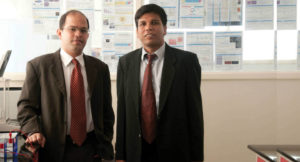Through its glocal approach, HCG, aims to cut the cost of cancer treatment by nearly 67 per cent. At present, the chain of hospitals has on board a team of 170 doctors spread across 20 centres in India

Dr. B.S. Ajaikumar has always swum against the tide. He went to the US in the 1970s to specialise in cardiology, but was drawn to oncology – an orphan field that was considered hopeless because of the lack of proper treatment methodologies.
He established a successful practice as an oncologist in the 1980s and employed a team of doctors in his clinic in Austin, Texas, where patients came to consult from over a 100 miles away. Not one to rest on his laurels, Dr. Ajaikumar travelled across India for six months visiting cancer centres and was appalled at the long waiting hours and the use of Cobalt therapy – which had been phased out in the U.S. His observations kickstarted his entrepreneurial journey in India where the objective was to overcome the hurdles to accessible, affordable and quality cancer treatment. Nearly three decades later, his Bengaluru-based venture Healthcare Global Enterprises (HCG), closed an IPO in March 2016 to further boost its expansion.
By linking all our centres, we ensure that the best quality of treatment is accessible without the patient having to travel to another city
Journeying towards a cause
In 1989, Dr. Ajaikumar set up Bharat Hospital in Mysore, then an underserved city, as a not for profit hospital. He was clear that he did not want to approach the government or philanthropists for funds to scale his effort so he along with a group of like-minded doctors in India established the Bangalore Institute of Oncology. “This was set up from money borrowed from the bank,” recollects Dr. Ajaikumar. The interest rates used to be in the range of 22 per cent to 24 per cent and getting a return was a big challenge. Dr.Ajaikumar closed the loan with his personal capital and this freed up the cash flows and enabled the institute to increase bed capacity from 25 to 80. From a single unit set up, it grew by acquiring centres with diagnostic capabilities since infrastructure and technology were two critical aspects for providing good cancer treatment.
In 2003, Dr. Ajaikumar established HCG as a chain of hospitals providing complete care for cancer patients; from diagnostics to treatment to post treatment management of the disease. With a focus on the conducting the business with integrity and reinvesting profits to ensure growth, HCG was built on a strong foundation of principles.
Growing with PE
Since 2006, the venture has received private equity funding to the tune of US $10 million from IDFC Alternatives and India Life Sciences Fund (who have since exited), Premji Invest, India Build Out Fund (now under Quadria Capital) and Temasek.
In March 2016, HCG announced an IPO of 1.16 crore equity shares at US $96 million, when the other three also partly exited the venture.
The company’s revenue has grown from Rs. 26 crore in FY 2006 to Rs. 600 crore in FY 2016. HCG has 170 doctors and 20 hospitals across the country. It has chosen to partner with doctors or centres that have a strong local understanding of the region they operate in and are keen to share in the HCG journey. This enables the company to combine their respective expertise and provide holistic treatment. For instance, the first partnership was with Dr. Raj Nagarkar of Nasik, a surgical oncologist while in Ahmedabad, HCG opted for a joint venture model. The end goal is to improve outcomes by providing technology, knowledge and quality at affordable costs. For this, the company has invested in technology, but refrained from investing in infrastructure, preferring to rent or lease buildings.
Treating glocally
Research and development is a vital cog at HCG as this helps in adopting more effective treatment methodology. One of the key focuses of HCG is to standardise treatment across the centres. It has set up a tumour board – a group of experts – who consult from the Bengaluru centre and this allows the patient to get treatment locally, without having to travel. “One of the prime costs in cancer treatment is the travel cost and the time spent by the patient away from the family. By linking all our centres, we ensure that the best quality of treatment is accessible without the patient having to travel to another city,” explains DrAjaikumar. He adds that the common complaint about rising healthcare costs is not applicable in the case of India, where the costs are lower even when compared to Africa. However, through this remote consultancy where needed, the patient can save up to 67 per cent of the cost incurred on treatment. “Also, I firmly believe in providing the right treatment the first time to minimise the chances of recurrence,” he says. Cost should not be the limiting factor for the right treatment, as if the cancer is not treated properly, it will recur and the cumulative cost will be higher than one-time cost.
Another paradigm-shift in the HCG approach is to avoid organ removal. “The consequences of organ removal can be deep, and psychological, which is not taken into account,” he says. Therefore, HCG focuses on organ preservation and focused treatment.
Pre-screening, use of genomics, liquid biopsy, these are just some of the latest diagnostic methods that HCG has invested in to improve outcomes based on individual requirements. These technologies are also being used for cardiology, neurology and inflammatory or infective pathologies, for better utilisation and cost effectiveness.
“We should stop using terms such as ‘victim’, ‘palliative care’ and the like,” asserts Dr. Ajaikumar. According to him, cancer is a lifestyle disease, like diabetes, and eliminating the use of these terms will help assuage associated fear from the minds of people. “People hesitate to get a lump examined because they fear it maybe cancer. If there were no fear, it maybe identified and treated earlier, thus avoiding all unpleasant consequences,” he points out.
Encouraging entrepreneur DNA
One of the reasons doctors become entrepreneurs is because they can never report to anyone. They are free spirits and believe in independent thinking, says Dr. Ajaikumar. “You have to be prepared to lose everything,” cautions Dr. Ajaikumar, who left the comforts of the West to pursue his passion of making quality cancer treatment available in India.
Currently, the hospital chain provides treatment to 40,000 new patients annually. In the next three to four years, the aim is to impact a 1,00,000 patients. Providing standardised quality of treatment at every stage, training the staff to match up to the required standards, setting up more centres and investing in technology will continue to be the focus areas for HCG.




